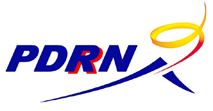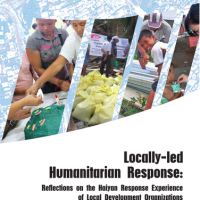2015 Annual Report
Year 2015 is the transition of the organization’s “Typhoon Yolanda Emergency Response” towards supporting the recovery effort of disaster affected population and communities focus in at least fifty-two (52) barangays in Eastern Samar, Leyte and Biliran provinces.
During the period, the country was faced with various socio-cultural and political events such as the state and Papal visit of Pope Francis of the Roman Catholic Church, the “Mamasapano Clash” that killed forty-four (44) members of the Special Action Forces of the
Philippines National Police (PNP), the probe on the graft and corruption charges filed against the Vice President and others. On the other hand, several disaster events also occurred such as Typhoons Nona and Lando that hit Luzon and the Visayas, big fire in Valenzuela City, and armed conflict in Minadanao that caused displacements to hundreds of affected population.
This report covers the major activities implemented in Pampanga, Eastern Samar, Leyte, Biliran, Surigao del Norte and Sur that include the five (5) major projects implemented in 2015, and these are the following:
- Increasing the DRRM capacity of Barangay Disaster Risk Reduction and Management Committees (BDRRMC). This supported twenty-two (22) barangay and municipal LGUs in the province of Biliran in terms of risk assessment, Contingency Planning, development of early warning system and others that reached approximately 669 individuals.
- Scaling up resilience in Governance, a multi-agency managed project in Caraga region that developed a pool of DRR champions, supported two (2) PDRRMOs in the development of provincial Contingency Plans, and reached approximately 682 trained individuals on risk assessment and contingency planning, including the development of pool of 35 school-based DRRM facilitators from in seven (7) school divisions in five (5) provinces of Caraga region.
- Improving food access of vulnerable households affected by Typhoon Ruby project was able to provide food package to 662 households in four (4) barangays the municipality of Can-Avid, Eastern Samar.
- Rebuilding damaged livelihoods, a small project that directly provided fishing gears, boat repair kits and financial capital of the poorest of the poor small fishers in Barangay Busali, Biliran, Biliran.
- Shelter Reconstruction project directly provided shelter repair kits to 800 households, and 72 workers on cash for work in Capoocan, Leyte.
Other major Institutional development activities also include the regular staff meeting and the series of training attended by the staff. PDRRN also maintained its collaboration with other local and international agencies and networks.
Part of this report also presented the major difficulties encountered during the implementation of the various projects, changes in the organization and the major plans for 2016.
To know more, you can download the 2015 full annual report via this link>>>
2016 Annual Report
Year 2016, the country was greeted by recurring disaster events specifically in Mindanao and the deafening political campaigns for the general elections in May which President Rodrigo Duterte put into power. Poverty incidence was recorded at 21.6% among population with approximately 3.8 million poor families located in the Visayas and Mindanao. Though the country achieved the highest economic growth in Asia with 6.8%, this was not concretely translated into improving the lives of ordinary Filipino citizens.
The country was confronted with sporadic armed conflict in Mindanao instigated specifically by the Maute Group in Lanao Del Sur last February 2017, the bombing in Davao City claimed by the Abu Sayaf Group among others that claimed deaths and injuries. Apart from these, Typhoons Lawin and Nina, the two (2) of the five (5) major Tropical Cyclones that hit Northern Luzon and Bicol region, respectively, prompted PDRRN to respond together with the Humanitarian Response Consortium (HRC).
During the year, PDRRN major projects implemented were mainly related to capacity building support to local government units (LGUs), early recovery, emergency response, and advocacy related activities. PDRRN major accomplishments during the year include the following:
- Strengthening the Governance Structures of LGUs to Promote the Rights of Men and Women Affected by Typhoon Yolanda: Implemented from June to October 2016 supported by Oxfam, the project benefited the municipal LGUs of Balangiga and Lawaan, Eastern Samar that formulated their respective Comprehensive Development Plans (CDP), Executive Legislative Agenda (ELA), Strategic WaSH Plans, Water Safety Plans, supported the improvement of water service maintenance, and catered a total of approximately 381 LGU personnel from both the executive and legislative branches during the series of training-workshops.
- Participatory Learning Research: Supported by Christian Aid, the research was able to develop a framework of a god locally-led humanitarian response extracting from the actual experiences of Christian Aid’s local NGO partners involved in the Typhoon Yolanda response. “Locally-led Humanitarian Response: Reflections on the Haiyan Response Experiences of Local Development Organizations”, concretely offers five (5) elements of locally-led humanitarian response that include operating framework, principles, resources and capacity of local actors, approaches or strategies such as community organizing work, and collaboration strategies with different modalities.
-
Improving quality and accountable humanitarian actions to promote dignity, safety and resiliency of disaster affected people: A short-term project funded by Oxfam attempted to consolidate the existing humanitarian guidelines of various government agencies and other non-government organizations, outlined the draft “Philippines Humanitarian Standards” based on the discussion if the 37 men (16) and women (21) coming from 29 organizations including government agencies, international NGOs, local NGOs and people’s organizations. This initiative was undertaken in collaboration with the Alliance of Sphere Advocates in the Philippines (ASAP).
- Strengthening the Humanitarian Response Consortium (HRC) to Promote Locally-Led Response. As part of the consortium, PDRRN, specifically the core staff and on-call personnel directly benefited from the various training activities of the consortium such as the review of the consortium contingency plan, manual of operations, implementing guidelines on WaSH, emergency food security and vulnerable livelihoods, and delivery of shelter assistance. The various capacity building activities were part of the project being supported by the Financial Enablers Project of the Start Network led by Oxfam.
-
Humanitarian Response: Two (2) major responses made by PDRRN during the year specifically related to Typhoons Lawin and Nina that occurred in October and December 2017, respectively.
Related to Typhoon Lawin, PDRRN with support from Oxfam directly implemented in the municipality of Alcala, Cagayan, entitled: “Rebuilding Damaged Livelihoods of Poor Households Affected by Typhoon Lawin in Cagayan”. With the aim to prevent hunger and immediate risks to wellbeing and prevent further indebtedness of poor people of 540 poor affected men and women through unconditional cash grants, cash for asset recovery, cash for care work and cash for work. The month of December 2017 was devoted to coordination and social preparation in three (3) target communities of Municipality of Alcala, Cagayan.
On the other hand, PDRRN led the HRC in the conduct of Rapid Assessment and Response in the Typhoon Nina affected areas in the province of Catanduanes. The full blown HRC response subsequently followed starting January 2017 with the support of Oxfam.
-
Advocacy and Networking: PDRRN main advocacy during the year was related to the call of localization of humanitarian response at the national and international levels. On April 21, 2017, PDRRN was one of the seven organizers of the national forum, dubbed as Balikbayan: Localizing Humanitarian Response that gathered around sixty (60) organizations from various regions. The forum agreed on the six (6) calls for commitments for localizing humanitarian emergency response. Related to this, PDRRN with support from Oxfam participated in the World Humanitarian Summit (WHS) held on May 23-24, 2016 in Turkey that worked hand-in hand with the delegation of the Philippines government and other non-government organizations.
Capacity-building support initiatives to partners include the conduct of “school-based disaster risk reduction and management” (SBDRRM) training both in Pampanga and Surigao del Norte, camp coordination and camp management in Tacloban City, and supported the humanitarian response orientation among local and international NGOs.
PDRRN maintained its link and participation in the Provincial Development Council (PDC), Provincial Peace and Order Council, Provincial Disaster Risk Reduction and Management Council (PDRRMC) all in Pampanga, Angeles City DRRMC, RDRRMC 3, DOH region 3, and National Anti-Poverty Commission (NAPC). On the other hand, PDRRN maintained its working relation with other NGO formations such as Alliance of Sphere Advocates (ASAP), READLANI, ABSNET, DRRNet Philippines, HRC, and NEAR.
-
Institutional Development: PDRRN conducted its regular Board of Directors’ Meeting, staff meeting, staff training. It maintained its partnership with the Church World Service Asia (CWS Asia), Christian Aid, Oxfam and the United Nations Development Program (UNDP).
To know more, you can download the 2016 full annual report via this link>>>



